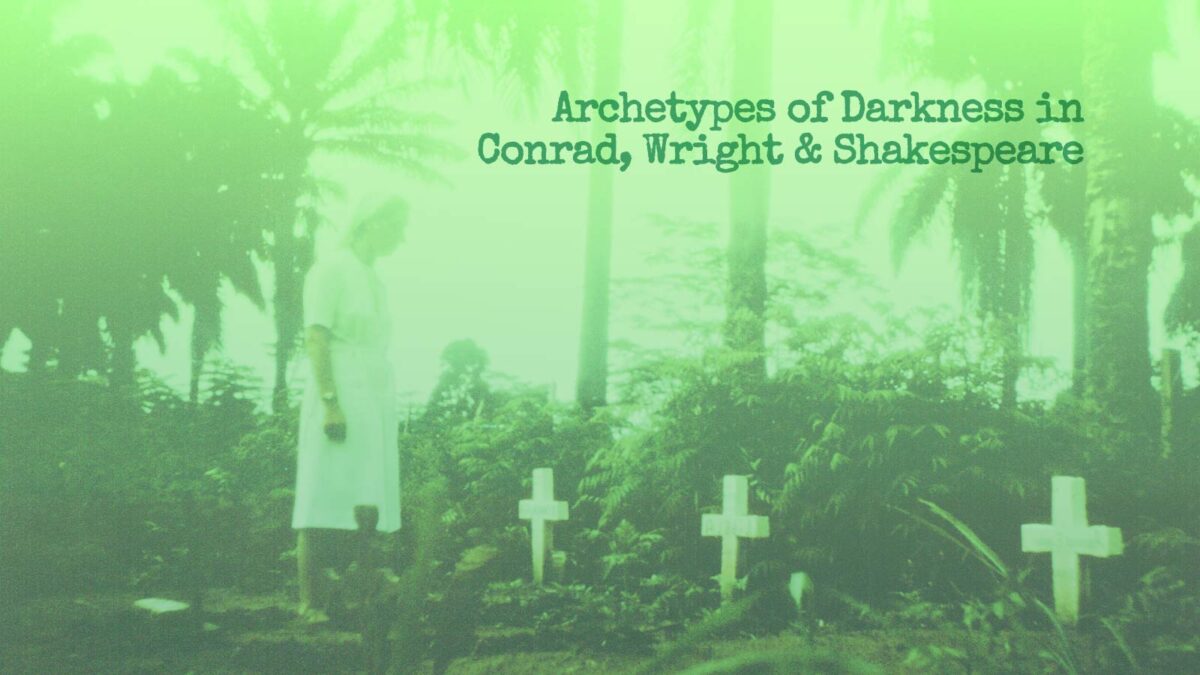A darkness that Kurtz saw and was able to comprehend – in Joseph Conrad’s novel Heart of Darkness – is ever present. This darkness is the morbid nature of all human hearts – commonly suppressed – but exemplified by Kurtz’s visions in the depths of the Congo. Marlow, the novel’s protagonist, is one who has taken a deep glance into these dark notions, and is able to recognize “The horror” that Kurtz spoke of, even after he has departed the Congo. Marlow is unable to ignore the “persistent whisper” that resonates all around him, the darkness visible in a world that now engulfs him. As a component of human nature, this darkness presides in all human life and can thus explain the nature of characters and situations amongst other pieces of literature.
In the life of the black archetype can be found the dark aspects of human nature, not as a product thereof, but as a premise suspended over the subject by means of a life of endless limitations created by an oppressive society. Amidst the life of Bigger Thomas, a character definitive of the black archetype, dark echoes of the morbid soul can be heard. “The horror! The horror.” While characters such as Bigger are living amongst the ‘horror’ that Kurtz saw, his morose life has been created by the darkness suppressed within the society of which he lives. Bigger’s demise occurs on account of his misled life, led astray by the dark aspects of a human civilization that surrounds him.
Another black archetype, whose demise is similarly dependent on the darkness of the human soul, is the title character from the Shakespearean play Othello. Othello’s life is manipulated and controlled by an external force whose intentions and actions are of the darkest origin. In the societies or individuals that surround both black archetypes, the horror and morally dark aspects of human nature can be found and rooted to the dilemmas and demise of both characters.
In a modern adaptation of Heart of Darkness, the film titled Apocalypse Now, the dark soul that is Kurtz’s vision, is in part explained by a man’s ability to kill without conscious in order to further their cause and prosper. Kurtz’s character in this film explains how a war could so easily be won with a small number of conscious-void soldiers such as these and how such men yield great power, for their actions are based upon necessity alone. Such determined men, as the film explains, are quite few and far between, for such will power is quite hard to come by amidst the war setting.
Large numbers of such strong-willed individuals, however, can be found in Richard Wright’s novel Native Son. This group is the prosperous white community that casts the shadow over Bigger and the black race of pre-civil rights Chicago. Confining blacks to certain black-zoned neighborhood districts, the whites exploit the race they view as inferior by overcharging them for single room apartments such as Bigger’s home. Mr. Dalton: the father of Bigger’s victim, Bigger’s employer and the owner of the South Side Real Estate Company, the company to whom Bigger’s family pays the large sum of eight dollars a month, and one such individual.
By employing Bigger as a chauffeur, Mr. Dalton rectifies his conscious (from the guilt of overcharging the black community), thus rendering it obsolete and non-existent. An individual who’s conscious has been satisfied by such a petty offering is now free to guiltlessly exploit and manipulate an entire race. The white community of the pre-civil rights period has become immune to guilt and has become able to manipulate the black race in order to prosper while furthering the cause of white supremacy.
Such an oppressive society has created a life for Bigger that is led by constant fear and apprehensions. Bigger’s means of self-expression are limited to acts of violence and destruction. The dark aspects concealed within the prosperous white community have transferred to the lives of the poverty-stricken black race and instilled animosity and dread for all aspects of life. During Bigger’s trial, Bigger’s lawyer expresses this transference and how such fear and hate has been “woven by our civilization into the very structure of his consciousness” (Native Son, Wright, 367). Bigger’s actions have become sole consequences of his apprehensions and his only outlet for his emotions are acts of destruction and violence. When Bigger committed the murder of both Mary Dalton and Bessie Mears, “He was living” (Wright, 366). Such restricted lives are the direct products of a society plagued by immorality and dark intentions as is the white society that casts the shadow that is Bigger’s life.
The morally dark aspects of human nature and society as a whole have been distilled down to Bigger’s life, through which these aspects are exemplified. The disgust and antipathy of the sicken society is symbolically represented by Bigger’s life. The horror amidst this civilization has been conveyed as the “unremitting hate of men” (Wright, 354) by Bigger’s lawyer, who insists that Bigger is a “tiny social symbol in relation to our whole sick social organism” (Wright, 354). A life whose sense of taboo and contentment deviates so immensely from practical applications of both personal attributes shows the effect of the morally sickened community that Bigger lives amongst. The morally dark aspects of human nature and society have distilled down to Bigger’s life, through which these aspects are exemplified.
The horror that Kurtz saw within himself and within life in general is undoubtedly present in Wright’s novel Native Son. Kurtz would agree that the notions envisioned to him in the Congo persistently occur amongst any type of human civilization, whether apparent or indiscernible. Dark aspects exist within every human soul. Greed, lust, hate and envy are such palpable examples of the morbid soul commonly found within any society. T. S. Eliot’s poem The Hollow Men, describes the place where the darkest of human souls meet, “There are no eyes here / In this valley of dying stars.” As is the capitalistic white race that surrounds Bigger, the hollow men, based upon Kurtz, lack the need or desire to acknowledge the implications of the world around them. They are indifferent to the consequences of their actions, for they are void of conscious in a world that has, as a result, become malleable to their actions. In this light, the dark aspects of the white race, exemplified by their relentless exploitation of the blacks, are synonymous to the sinister souls of the hollow men.
Richard Wright sought to identify the sicken protocol of the pre-civil rights society and its effects upon black individuals such as Bigger Thomas. Not only has it become apparent through the text that the lives created are ones of strong social irregularity and disgust, but Wright has also been able to successfully identify the dark intentions and conscious-free deliberations embedded within the white race that creates the lives that are deemed the demise of civilization. This likeness to Conrad’s vision of Heart of Darkness, shows that ‘the horror’ and the morbid soul are morose facets of human nature that naturally occur in human societies.
As Bigger has been formed by the darkness of his society, Othello’s life has also been greatly manipulated by the greed and jealousy of Iago, in Shakespeare’s play Othello. Iago’s ability to guiltlessly act upon Othello is synonymous to that of Bigger’s white society. His actions are deceptive and strictly self-serving. He is doubtlessly a “hollow man” whose life is led by envy. With out conscious, Iago manipulates his good friends in pursuit of a higher position. Iago taints Othello’s vision by flawlessly blinding him to the truth of his deceptive ways. He sacrifices even his maiden Emilia in pursuit of his goal, exemplifying his determination and the extent that the dark greed of his soul has permeated any traces of humanity. He is a sicken soldier, one whose conscious will not interfere with the task at hand.
As a result of Iago’s strong-willed deception, Othello’s life is now what Iago wishes it to be. Othello has fallen ill to the veil of blindness that Iago has let fall before his eyes. Othello is no longer able to give his trust to those individuals indebted to it the most. As Bigger’s life was cataclysmically altered on behalf of a morally void society, Othello’s has become overrun by an individual whose objectives are of pure greed and envy. Near the close of the play, Othello’s relations to others are still dictated by Iago and he is largely detached from reality. Othello entitles his dead innocent wife Desdemona an “ill-starred wench” (Othello, Shakespeare, a.5 s.2 ln.323) before realizing how misled he has become and prior to his suicide.
The greed and envy that Iago’s intentions embody represent the dark aspects of the human heart. Iago sought to gain from the suffering of others while retaining a guiltless state. Iago sacrifices nearly everything dear to him portraying his relentless willpower and the extent of his dark soul. While the horror within the society surrounding Bigger is to an extent hidden to the unconditioned eye, Iago’s deceptive and indecent conduct is flawless exemplar of the dark side of human nature and the horror that is exemplified by Iago’s greed.
Towards the end of Heart of Darkness, Marlow explains the lasting implications of Kurtz’s infamous words. “The dusk was repeating them in a persistent whisper all around us, in a whisper that seemed to swell menacingly like the first whisper of a rising wind. ‘The horror! The horror.’” (Heart of Darkness, Conrad, 75).
Marlow was stunned and unable to comprehend the fact that Kurtz’s visions were invisible to her. In Marlow’s mind the horror of human souls is forever present as it encompasses every aspect of life and can be found as a mimicking whisper in all things. Marlow identifies Kurtz’s vision as a sardonic yet omnipresent form of consciousness for those like Marlow who are able to acknowledge its presence.
The Congo, a poem by Vachel Lindsay, describes the ever present horror of life as the dreaded “Congo tune” that was commonly sung amongst the natives of the Congo. But even after the fortification of the Congo by means of European colonization, and even after the “forests, the beasts and the men” had been redeemed, the vulture, who flies above them all still dares “to cry, in the silence, the Congo tune.”
As a static aspect of the human condition, the horror of which Kurtz spoke exists amongst all forms of human civilization, be it on a personal level or that of an entire society. Amongst different works of literature the dark aspects of human nature can be highlighted and identified, most commonly in the forms of countless greed and guiltless self-benefit at the expense of another’s anguish. What led to the demise of both Bigger Thomas and Othello, is the horror and the morally morbid condition of the societies in which they lived, dark aspects of human nature persistent in places of civil society.

